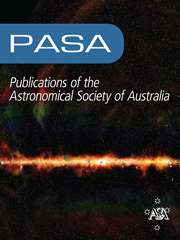Article contents
Effect of a Magnetic Field on Finite Amplitude Convection
Published online by Cambridge University Press: 25 April 2016
Extract
It is well known that a magnetic field has an inhibiting effect on thermal convection. It is also likely that a magnetic field might have a marked effect on the preferred cell-size and it is therefore of some importance to investigate the effect of such a field on finite amplitude convection. We restrict ourselves to fluids in which the Boussinesq approximation holds. For astrophysical application, especially in a study of the convective layer of the Sun, one should consider the compressible case but unfortunately the full compressible equations are much more difficult to handle numerically. In any case, the integration of the equations for the incompressible case will yield at least an indication of the effect of a magnetic field.
- Type
- Contributions
- Information
- Publications of the Astronomical Society of Australia , Volume 2 , Issue 2 , March 1972 , pp. 93 - 94
- Copyright
- Copyright © Astronomical Society of Australia 1972
References
- 1
- Cited by




